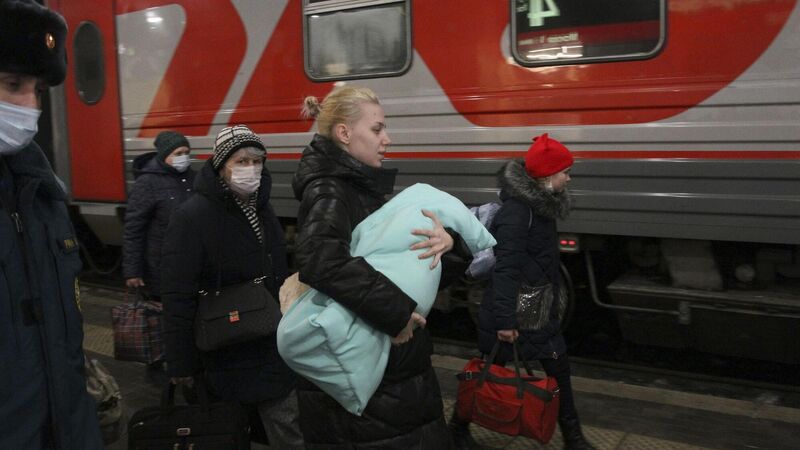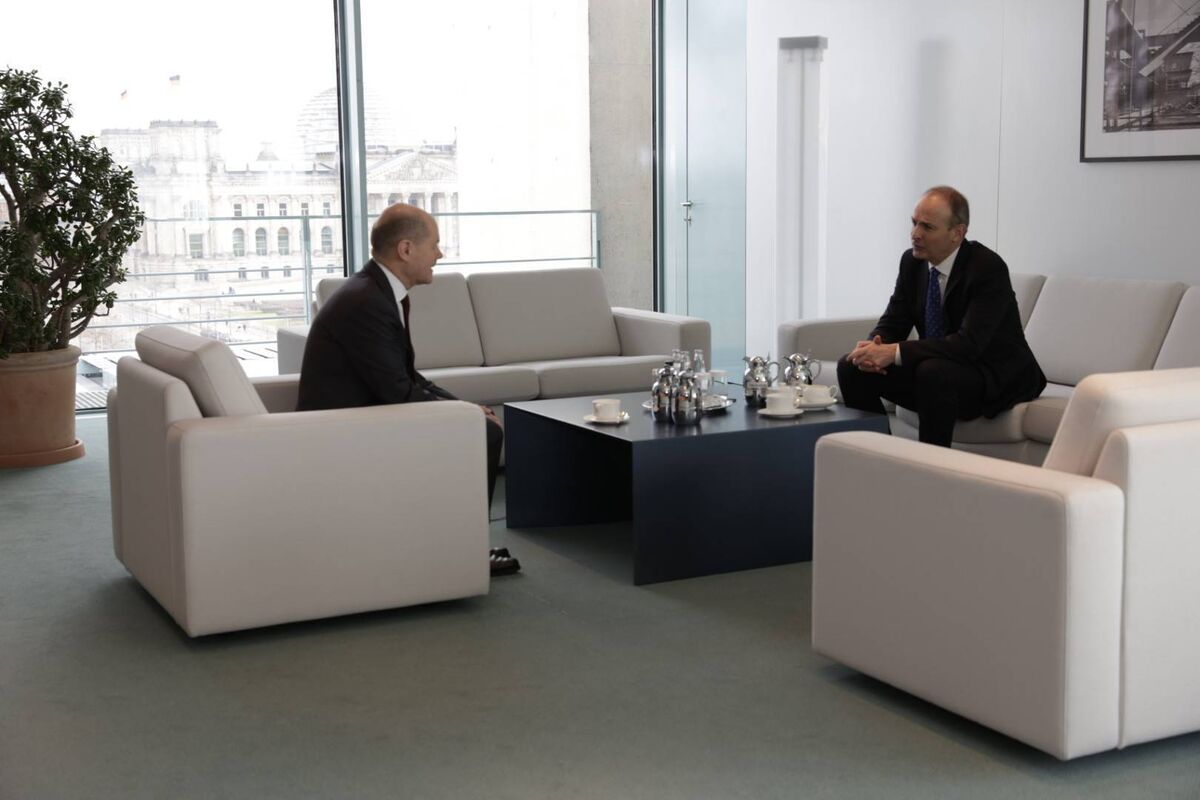Taoiseach condemns 'chilling effect' of Russian incursion into Ukraine

People from the Donetsk region, the territory controlled by pro-Russia separatist governments in eastern Ukraine, leave a train to be taken to temporary residences in Nizhny Novgorod region, at the railway station in Nizhny Novgorod, Russia. A long-feared Russian invasion of Ukraine appears to be imminent, if not already underway, with Russian President Vladimir Putin ordering forces into separatist regions of eastern Ukraine.
Taoiseach Micheál Martin said the Russian incursion into Ukraine last night will have a “chilling effect” on small countries across Europe.
The EU could impose fresh economic sanctions on Russia as early as today on foot of its incursion into Ukraine, the Taoiseach and German Chancellor have said, with Chancellor Sholz announcing that Germany has blocked the certification of the Nord Stream 2 gas pipeline from Russia.
Speaking ahead of their first bilateral meeting in Berlin, both leaders were scathing in their condemnation of Vladimir Putin’s actions overnight but said they hoped a de-escalation of tensions was still possible.
Mr Martin said the unity of the European Union is its strength and there is a very clear unity of purpose between all of the EU member states in relation to this issue. “From from Ireland's perspective as a small, open democracy, we celebrate 100 years of broken democracy this year. The action taken yesterday evening by President Putin is unacceptable to us.

“All small states are entitled to their nationhood, to their freedom, and to their independence. And I think the statement creates a chilling effect for many smaller states across the European continent,” he said.
“We stand by those principles of self-determination and sovereignty. And in that perspective, I believe that will be a coordinated response in relation to last evening's announcement, but also then we stand ready for even stronger responses in respect of any further actions will be coordinated among the member states,” he said.
Chancellor Scholz said the situation is serious and remains serious.
“The troops are there and none of us can tell at this point in time how things will evolve. So it is important that we react to what has happened immediately and that this happens quickly. And that the EU and the US and many others as well act together,” he said.
The Chancellor said it is very important that there is a collective response from the European Union and also close consultation with the United States.
“This is what we have prepared and what we are discussing now. It is about determined action that we will take now. These are actions which cannot be accepted,” he said.
“Over a long period of time, we have prepared for this situation. There are other sanctions that we can trigger if additional measures are taken,” he said.
Mr Martin and Chancellor Scholz are having a working lunch to discuss a wide range of issues including Brexit, Irish-German trade as well as the Ukraine crisis.
Mr Martin said the announcement by President Putin on Monday that Russia was recognising the separatist regions in Ukraine crosses a line as a flagrant violation of international law and a breach of Ukraine’s sovereignty.
“It breaches the fundamental principles of the UN Charter, under which all members must refrain from the threat or use of force against the territorial integrity or political independence of any state,” he said.

“As I have said, together with our EU partners, Ireland stands in solidarity with Ukraine. The Chancellor and I discussed the EU’s response — which will be robust. I again, call on Russia to de-escalate, and to withdraw its military forces from the Ukrainian border,” he added.
Mr Martin also said that Ireland wants to see a strong and durable partnership between the EU and the UK in the future. For this to happen, existing agreements — including the Protocol — need to be implemented in good faith.
“Vice-President Šefčovič and the Commission continue to have my full support in the important work that they are doing towards securing that goal. I hope that the British Government will engage constructively with this work so that we can find pragmatic solutions to some of the issues that have arisen, within the framework of the Protocol,” he added.
The Taoiseach was greeted by Chancellor Scholz at the Bundestag with full military honours during which Amhrán na bhFiann was played by the army band.
Meanwhile, Tánaiste Leo Varadkar says the government's concern is for the safety and security of the people in Ukraine and the country's sovereignty.
"Well, obviously our priority is to make sure that our citizens are safe and a lot of work has been done to ensure the Irish citizens of Ukraine and their families can come to Ireland," Mr Varadkar said.
"A lot of work to be done around families, as you know, that are availing of service services in Ukraine as well. A lot of work has been done around sanctions, preparing to impose those sanctions and also preparing our businesses for any negative impacts that may occur as a result of retaliatory sanctions.
"In terms of gas supplies and the cost of petrol, the cost of gas. Nobody can predict for sure what that might do but will coordinate any response at a European level."

Mr Varadkar added that the government is "aware" that in modern warfare, "cyber attacks are part of modern warfare, and that's why we've kind of beefed up the National Cybersecurity Centre in particular the last couple of years to prepare for that were to occur but we've no reason from our intelligence to be concerned at the moment."
Mr Varadkar added the Government stands by Ukraine.
"We believe their territorial integrity should be respected and that Ukraine as an independent sovereign state should be able to determine its own course, particularly in relation to future membership of the European Union.
"We condemn the decision of President Putin and the Russian Government to recognise two breakaway republics in eastern Ukraine and to send Russian troops in there. It will be necessary now for the European Union to impose sanctions on Russia.
"We have agreed a package of sanctions at European level I don't think they will all be imposed at this point. But some of them will. And that will have an impact, unfortunately, on Irish business, that sort of the sanctions themselves, but more retaliatory measures that the Russian government may take against European companies against Irish and Irish companies.
"But I think we have to do what's right here and that is to stand by the territorial integrity of Ukraine and to respect the right of that democratic independent country to determine its own future."












